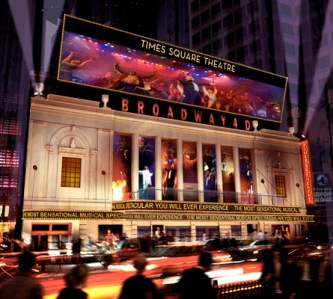All the Twists and Turns Behind Times Square Theater, Last Week’s Most Creative Deal of the Year Winner
By Daniel Edward Rosen June 19, 2012 10:00 am
reprintsMarvel Comics kicked the tires for a proposed flagship store and theme restaurant based on the comic book publisher’s legion of mutant superheroes. Burger King considered changing the 1920s-vintage theater into “The World’s Largest Burger King.” Even the professional grapplers from the World Wrestling Federation envisioned the domed auditorium as a studio-slash-retail-slash-performance space, where wrestlers would fight as diners ate their suppers. Alas, like the other contenders, the WWF walked away.
And so it went for the brokers and potential tenants seeking to fill the old Times Square Theater, a space so pockmarked with hidden challenges, prohibitive rent requirements and aging infrastructure, that the quest to find a suitable tenant lurched on for an entire decade, from shortly after George W. Bush’s election as president to the second half of Barack Obama’s first term in office.
Considering the false starts and dashed hopes C. Bradley Mendelson and Alan Schmerzler faced while negotiating their drama-filled deal last year for 217 West 42nd Street, an award ceremony on par with the Tony’s wouldn’t have been out of the question.
“We ran into a recession, we ran into 9/11, there was a lot of stuff going on,” said Mr. Mendelson upon winning the Real Estate Board of New York’s coveted Most Creative Deal of the Year award last week at the 14th Annual Retail Awards at the 101 Club. “We actually should have gotten an award for keeping the agency for as long we did.”

Chase Welles, the REBNY retail committee chairman who bestowed the award, and who also announced the Key Foods lease at 55 Fulton Street as winner of the coveted Retail Deal That Most Significantly Benefits the Manhattan Retail Market prize, put it another way: “I just have to say that we read this submission, and it just kept going on and on, and the deal kept dying and coming back to life, and new investors—it was everything that you hate about the business that we’re in.”
The duo’s trials and tribulations began in earnest in 1994. The Times Square area of old was, at best, a morass of XXX-movie theaters and dive bars. But the area was on the cusp of reform, set forth by New York City and the state’s General Project Plan, which aimed to establish a stretch of theaters along 42nd Street between Broadway and Eighth Avenues as “irreplaceable architectural and historical assets.”
The New 42nd Street, a nonprofit group, received control of seven of the eight historic theaters in Times Square in 1990, including possession of 99-year master leases.
The New 42nd Street’s board gave Mr. Mendelson, then a broker for the Edward S. Gordon Company’s Retail Group, the assignment of leasing out the Times Square Theater. But the building, which had been vacant for a decade, had fallen into disrepair. It had been stripped of its HVAC, electrical wiring and plumbing, and the stage and proscenium setting made it a tricky space to convert into a nontheatrical use.
There were other challenges as well.



